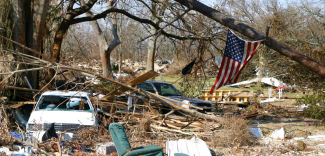
Get Ready: Financial Readiness for Natural Disasters
Natural disasters like floods, hurricanes, fires, and tornadoes can strike unexpectedly, leaving behind significant damage and financial strain. Recently, our neighbors in Western North Carolina have faced these challenges in the aftermath of Hurricane Helene followed by Hurricane Milton ravaging Florida. Having a solid financial plan and an emergency preparedness strategy in place can make the recovery and rebuilding process smoother. No matter where you live, the risk of natural disasters is always present. It’s essential to understand the potential threats to your area and plan accordingly. Here are a few key financial considerations to keep in mind when preparing for emergencies:
Have a financial plan in place that includes emergency funds.
Having a financial plan that includes an emergency fund is essential for financial security and peace of mind. Life can be unpredictable, and unexpected events like medical emergencies, job loss, or natural disasters can quickly create financial strain. In the case of a natural disaster, you’ll want to think in terms of temporary housing, rental cars, and having to purchase essential supplies like food, water, and clothing. Be sure to save all receipts for disaster-related expenses as they may be needed for insurance claims or tax purposes.
An emergency fund provides a financial cushion, allowing you to cover urgent expenses without derailing your long-term goals or going into debt. By planning ahead, you can navigate unforeseen challenges with greater confidence and stability. A financial planner can help you navigate your specific situation to ensure you’re meeting your goals and needs.
Make copies of important documents and store them in a safe place.
It’s crucial to store important documents in a secure location that’s preferably waterproof and fireproof, such as a safe. In addition to physical copies, consider placing digital copies on a portable jump drive or securely in the cloud. However, during a power outage, having hard copies can be more practical. It’s also wise to store copies of these documents outside your home, like in a safe deposit box or with a trusted family member. Having easy access to these documents is essential, especially if you need to evacuate quickly. Important documents to store in your safe location include:
Driver’s License
Passport
Copies of Credit Cards
Social Security Card
Marriage/Birth/Death Certificates
Car Titles
Land Ownership Deeds
Tax Documents
Insurance Cards/Documents
Medical Records
A list of financial assets (with account numbers and contact details)
Phone numbers and addresses for family, friends, and other important contacts
It’s also a good idea to keep some cash on hand in a secure place, as it can be invaluable during an emergency when electronic payment systems may be down due to power outages, etc.
Document your belongings for insurance purposes.
Make an inventory list of your assets and capture video or photos of them to help facilitate any insurance claims due to damage or loss. Keep these photos/videos with the rest of your important documents so they are easy to access if you need them. It’s also a good idea to review your insurance coverage on a routine basis to ensure you’re covered for any emergency you may encounter. In the case of natural disasters, if you live in a place that’s prone to flooding, flood insurance may be necessary. Reach out to your local insurance company to understand what you may or may not need.
Review and update your estate planning documents.
Regularly reviewing your estate planning documents is essential to ensure they reflect your current wishes and life circumstances. Major life changes, such as marriage, the birth of a child, the death of a loved one, or the acquisition of new assets, may require updates to your will, trust, or beneficiary designations. Keeping these documents up to date helps avoid confusion, ensures your loved ones are provided for, and guarantees that your assets are distributed according to your wishes. Regular reviews also ensure that your estate plan aligns with any changes in laws or tax regulations.
Beware of scams following a natural disaster.
Following a natural disaster, scams often surge as fraudsters exploit the chaos and vulnerability of affected individuals and communities. These scams can take many forms, from fake charity organizations soliciting donations to fraudulent contractors offering quick repairs for upfront payments. It’s important to remain vigilant during these times by thoroughly vetting any service providers, contractors, or organizations you engage with. Be cautious of unsolicited calls or emails and avoid sharing personal information with unknown sources. Taking the time to research and verify can protect you from further financial harm during an already difficult time.
Don’t be afraid to reach out for help following a natural disaster.
In the aftermath of a disaster, it’s important to remember that you don’t have to face recovery alone. There are many reputable organizations dedicated to providing assistance, whether you need shelter, food, financial aid, or emotional support. Reaching out for help can ease the burden and speed up your recovery. Don’t hesitate to seek assistance from trusted local agencies, national relief organizations, or your community – these resources are there to help you rebuild and regain stability.
If you have questions about your financial space and whether or not you are best prepared financially for an emergency, call us at (704) 987-1425 or visit us virtually at www.northmainfinancial.com. If you wish to schedule an introductory meeting, we would be happy to meet with you at no cost or obligation to you.
These Blogs are provided for informational purposes only and should not be construed as investment advice. Any opinions or forecasts contained herein reflect the subjective judgments and assumptions of the authors only and do not necessarily reflect the views of Osaic Financial.

